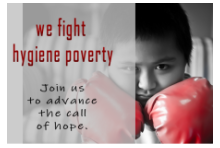WHAT IS HYGIENE POVERTY
Hygiene poverty is when individuals and families cannot afford to purchase essential products to keep themselves and their homes clean.
HYGIENE POVERTY CAN LOOK LIKE:
• Brushing teeth without toothpaste
• Bathing without soap
• Only washing the children’s clothes
• Reusing diapers
• Borrowing from family and friends
ITS EFFECTS
Good hygiene is essential for staying healthy.
• Diseases as a result of poor hygiene pose a risk to everyone, but people with weakened immune systems, elderly, and children are the most vulnerable.
o The rate of oral disease is widespread and the United States spends more than $124 billion on dental care costs each year. (Dirty Hands, Dirty Secrets)
• Poor personal hygiene often results in rejection from others.
o Researchers have found in looking into the roots of rejection evidence that the pain of rejection is not very different from the pain of a physical injury.
o People have a fundamental need to belong. (Weir, 2012. p. 50)
WHO'S THERE TO HELP?
There are many public programs to help families with health care, food and housing, but none to help with hygiene products.
• SNAP and WIC (programs used by most lower income households) do not cover hygiene products. (America’s Unspoken Hygiene Crisis)
• Some accessibility at food pantries with scarce provision of hygiene products or organizations with a singular focus such as a diaper ministry.
WE'RE THERE TO HELP!
We’re fighting against hygiene poverty, to alleviate the shame, desperation, and increased risk of illness and disease which often ensue.
• Serving Southeastern Wisconsin moderate to very low-income Individuals and families.
• Provide hygiene products on a regular basis for the entire household, adults, children, infants and their home.
• Some of the products provided are shampoo, deodorant, body wash, toothpaste, toothbrush, baby bath/shampoo, baby wipes, dishwashing detergent, multi-purpose cleaner, and laundry detergent.
• Since 2017 we have already served 6,408 households, 75,489 hygiene products.
LIVES IMPACTED
• Melissa W.- It’s hard to keep up with bills, groceries, car expenses and hygiene products. Every 2 weeks I struggle to get our basic needs.
• Tabitha G.- Receiving these supplies would ease some of the burden I’m carrying and help me focus my limited resources on other critical needs, like food or transportation. It would also show me that I’m not alone and that someone cares about my well-being
• Michelle P.- I will finally be able to clean my apartment with actual cleaning products instead of hand soap, I won't need to borrow detergent & dishwashing soap or toilet paper from neighbors anymore. I've been using tiny hotel shampoos & soaps I got from the homeless
• Preston G.- It will help me in the process of reestablishing myself, to maintain proper hygiene and present myself properly in search of stable housing and employment.
IT TAKES ALL OF US
“Hygiene poverty is not just a matter of personal inconvenience; it's a systemic issue with far-reaching implications for public health. By acknowledging the root causes of hygiene poverty and taking concrete steps to address them, we can create a world where everyone has access to the basic hygiene resources they need to lead healthy lives, and in the event of illness, what they need to recover safely” (Mitchell, 2024).
References:
Dettol. Dirty Hands, Dirty Secrets: Diseases Caused By Poor Hygiene. https://www.dettol.co.za/expert-advice/personal-health-hygiene/effects-o...
Mitchell, E. (February 23, 2024). Hygiene Poverty and Its Impact on Infection Control and Prevention. EOScu. https://blog.eoscu.com/blog/hygiene-poverty-and-its-impact-on-infection-...
The Century Foundation. America’s Unspoken Hygiene Crisis. https://tcf.org/content/commentary/americas-unspoken-hygiene-crisis/
Weir, K. (2012, April) Science Watch The pain of social rejection. American Psychological Association. https://www.apa.org/monitor/2012/04/rejection
